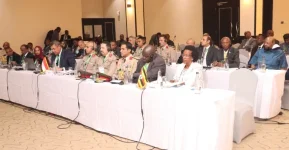Uganda's defense minister warns that Somalia faces a growing security threat. He says more troops are needed right away to stop Al-Shabaab fighters from taking over key areas. The militants recently captured some Somali military bases, putting the government at risk. This threatens years of progress against the terror group. The situation affects the entire Horn of Africa region.
Fighting broke out Thursday morning when Al-Shabaab briefly seized a major military base in Middle Shabelle. This attack came shortly after militants took control of Adan Yabaal on April 18. Both towns form an important path to central bases that may be attacked next. The violence puts pressure on African Union forces as they plan to hand over security duties to Somali troops. Officials want to create a review system led by President Museveni to improve coordination.
Money remains a major problem for peacekeeping efforts. African Union leaders asked for $190 million for 2025 operations, comparing this to the much higher cost of piracy in earlier years. UN funding support is needed urgently. President Museveni believes Somalia must address deeper issues like tribal politics that make it hard to build a stable army. Somalia's foreign minister thanked countries sending troops but admitted his nation cannot defeat Al-Shabaab alone.
Military experts point to leadership problems as a reason for recent losses. Army chiefs change often, disrupting training programs. The government has replaced experienced local fighters with new soldiers who received little preparation. As more fresh troops arrived, African Union forces pulled back from some areas. These new forces were not ready for their responsibilities. Recent political fights about constitutional changes have also taken attention away from fighting terrorists.
Ministers from neighboring countries promised to keep supporting Somalia. Egypt announced a stronger partnership with Somalia. Kenya mentioned challenges with the transition between peacekeeping missions. The United States suggested different funding approaches because donors are becoming less willing to help. With militants gaining territory, officials called for immediate reinforcements to prevent further collapse across the region.
Fighting broke out Thursday morning when Al-Shabaab briefly seized a major military base in Middle Shabelle. This attack came shortly after militants took control of Adan Yabaal on April 18. Both towns form an important path to central bases that may be attacked next. The violence puts pressure on African Union forces as they plan to hand over security duties to Somali troops. Officials want to create a review system led by President Museveni to improve coordination.
Money remains a major problem for peacekeeping efforts. African Union leaders asked for $190 million for 2025 operations, comparing this to the much higher cost of piracy in earlier years. UN funding support is needed urgently. President Museveni believes Somalia must address deeper issues like tribal politics that make it hard to build a stable army. Somalia's foreign minister thanked countries sending troops but admitted his nation cannot defeat Al-Shabaab alone.
Military experts point to leadership problems as a reason for recent losses. Army chiefs change often, disrupting training programs. The government has replaced experienced local fighters with new soldiers who received little preparation. As more fresh troops arrived, African Union forces pulled back from some areas. These new forces were not ready for their responsibilities. Recent political fights about constitutional changes have also taken attention away from fighting terrorists.
Ministers from neighboring countries promised to keep supporting Somalia. Egypt announced a stronger partnership with Somalia. Kenya mentioned challenges with the transition between peacekeeping missions. The United States suggested different funding approaches because donors are becoming less willing to help. With militants gaining territory, officials called for immediate reinforcements to prevent further collapse across the region.












